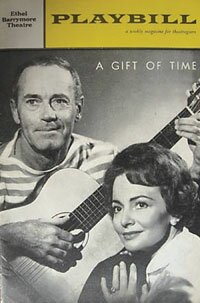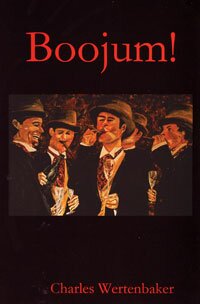Boojum! The novel (and author) that time forgot

Henry Fonda played Wertenbaker on Broadway in 1962.
PLAYBILL
Charles Wertenbaker is the forgotten man of twentieth-century American literature. He chronicled D-Day with Robert Capa, penned some of the best-selling novels of his day, and even his death became a Broadway play. Now, his first novel, Boojum!, reappears thanks to a tiny Charlottesville press.
So apoplectically pissed off by their scion's novel was his prominent old Virginia family (the 1830 Wertenbaker House is the oldest in Charlottesville's Wertland historic district) that, like Thomas Wolfe, he literally could not "go home again."
His second novel, Peter the Drunk, published about a year later, did nothing to lessen the old folks' rage. He wrote a one-page preface complaining bitterly about the family reaction:
Less than a month after my first novel was published, I have been denounced as a pornographer from an Episcopal pulpit, branded as a liar by a hypocritical editor, and accused by my maiden aunt of dragging out a family skeleton and rattling its bones in the face of the multitude.
Wertenbaker bought retirement property here in the late 1940s, but thinking better of the decision chickened out-– or "nubbed out," as he and his degenerate young pals at UVA would put it. Things were still, after 20 years, just that hot.
How could the world have forgotten Wertenbaker? How, especially, could super-literary Charlottesville have forgotten one of its own? He wrote several more novels, all thinly disguised histories of leading families, and all well-received critically. He knew everybody-– including Time's Henry Luce (with whom he was best friends until events of the day broke them up in the early ‘50s), Hemingway, Alger Hiss, Whittaker Chambers, Irwin Shaw, John Hersey, and Ernie Pyle.
Although well past forty and supposedly the magazine's desk-bound foreign editor, Wertenbaker covered the invasion of Normandy in person for Time and wrote a brilliant hour-by-hour account: a book called Invasion, illustrated by Capa's immortal combat photographs.
Wertenbaker and Capa also became the first journalists to crack into Paris following the liberation, manning the battered jeep that was second in line behind the head jeep– that of France's General Le Clerc. They were all showered with roses. A day or two later, Wertenbaker accompanied Hemingway in the famous Liberation of the Ritz Bar. (As long as they were at it, they also liberated Shakespeare & Co., the famous Paris bookstore that had first published Joyce's Ulysses.)
After the war and back in New York at Time, Wertenbaker and Luce fell out over Communism, McCarthyism, and the fast-developing Cold War. Luce had taken a hard right-turn, while Wertenbaker remained the tolerant liberal he had always been.
A little past the age of 50, he took his pregnant wife and went off to live as a bohemian artist in Basque country. Two years later, he received a sudden terminal cancer diagnosis. The upshot was that his wife Lael Tucker Wertenbaker helped him perform an assisted suicide– the subject of her own harrowing memoir Death of a Man (1956). Playwright Garson Kanin (husband to the great Ruth Gordon) was so struck by Lael's book that he turned it into a Broadway play– starring as Charles and Lael Wertenbaker superstars Henry Fonda and Olivia de Haviland.
And then, silence.
The world suddenly, unaccountably, forgot all about Wertenbaker. But now, nearly 50 years after Kanin's play, Matt Farrell's Hypocrite Press has republished Boojum! It was the right choice from amongst this writer's many books to bring back into print first, because it is the one that will most likely fascinate readers today, nearly a hundred years after it was written, and perhaps a hundred years from today as well– especially those readers who remain passionately obsessed with the early-1920s world of Waugh's Brideshead and Fitzgerald's Flappers and Philosophers.
Boojum! gives you that world– romantically but unsentimentally drenched in the moonlight and magnolias of long-ago UVa and Charlottesville, centering on a wild young poet who could not– and did not want to– stay out of trouble.
It's an extraordinarily loopy novel, partly written when he was still in his teens at UVA right after WW I. We see the Corner as it was 90 years ago, the never-changing railroad tracks with their never-ending chain of squeaking boxcars. We see golden lads and lasses at play; we see them dying as the result of that play; we get no moralizing whatsoever. (Caution: the novel also contains brief examples of the racist language and attitudes typical of the Anglo-American fiction of the era.)
The first third of the novel chronicles the young hero's hard-drinking, Prohibition-era escapades as a poetic pre-Animal House frat boy at Mr. Jefferson's University. The second third tells how he dropped out (a euphemism, that) and boho'd around the world on trains and freighters. The third third shows our protagonist coming home– briefly– and getting married.
The end, set in San Francisco, brings all three thirds together in a shocking (for its time) anti-Graduate conclusion that will make some readers grimace, make others laugh out loud, and probably make a few others (like me) do both at once.
It's that very end that makes you see, just when you think you're about done with this already weird-enough book, how weird it really is. Thankfully, it's back.
~
Leo Daugherty is Professor Emeritus of Literature and Linguistics at The Evergreen State College, and for 10 years has been a humanities lecturer at UVA, where he teaches senior-level courses in Shakespeare and other stuff.
